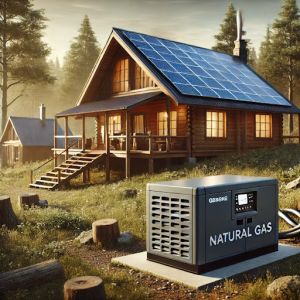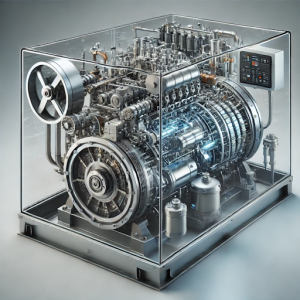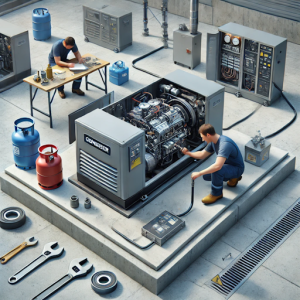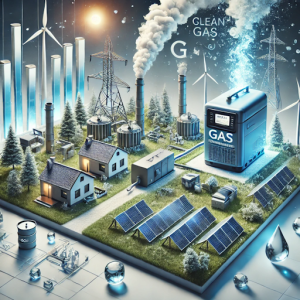Discover the Powerful Advantages of Natural Gas Generators for Sustainable Off-Grid Living
Natural gas generators have emerged as a top-tier choice for those seeking a reliable and efficient power source for homes or cabins situated in remote locations. Understanding the various methods of energy generation is essential for embarking on a successful off-grid journey. The unique benefits of natural gas generators include their remarkable reliability, affordability, and eco-friendly characteristics, making them an appealing option for off-grid enthusiasts who value sustainability and energy efficiency. Investing in a natural gas generator can significantly enhance your off-grid experience, ensuring that your energy needs are met without compromising your environmental values.
In today’s rapidly evolving technology landscape, the allure of off-grid living has captivated many individuals. Whether driven by a desire for sustainability, autonomy, or simply the pursuit of a self-sufficient lifestyle, disconnecting from traditional power grids can be a deeply rewarding experience. Off-grid power solutions enable you to harness energy from renewable resources or alternative fuels, allowing for a comfortable living experience that does not rely on conventional electricity sources. This independence not only promotes a sustainable lifestyle but also fosters a deeper connection with nature.
By equipping yourself with the necessary knowledge and preparation, you can effectively integrate a natural gas generator into your off-grid lifestyle, ensuring that your essential power needs are consistently met. This article will delve into the myriad benefits of natural gas generators, clarify their operational mechanics, and highlight critical factors to consider when selecting and installing them for your unique off-grid setup. Understanding these elements will empower you to make informed decisions about your energy solutions.
 Essential Insights to Enhance Your Off-Grid Power Solutions
Essential Insights to Enhance Your Off-Grid Power Solutions
- Off-grid power solutions liberate you from traditional energy sources, making them indispensable for remote living or during unforeseen power outages.
- Natural gas generators deliver reliable and efficient energy production with significantly lower emissions compared to diesel or gasoline alternatives, promoting a cleaner environment.
- These generators function by burning natural gas to generate mechanical energy, which is then converted into electrical energy through an efficient generator system.
- When selecting a natural gas generator, it is imperative to evaluate factors such as power output, fuel efficiency, and maintenance requirements to ensure optimal performance.
- Proper installation and routine maintenance are essential for ensuring the efficient and safe operation of your natural gas generator, maximizing its lifespan and performance.
Uncover the Unmatched Benefits of Natural Gas Generators for Reliable Power Generation
A standout feature of natural gas generators is their extraordinary reliability. By opting for a natural gas generator to meet your off-grid energy demands, you can depend on a steady and consistent power supply tailored to your needs. Unlike solar panels or wind turbines, which can be heavily influenced by weather conditions, natural gas generators provide stable energy output that remains unaffected by external changes. This reliability is indispensable for individuals who rely on electricity for critical functions such as heating, refrigeration, and operating medical devices.
Having the assurance that your generator will deliver power during essential times fosters peace of mind. In addition to their impressive reliability, natural gas generators offer significant cost savings. Although the initial investment may be higher compared to some alternative off-grid solutions, the long-term financial benefits can be considerable. Natural gas is generally more affordable than gasoline or diesel, resulting in lower operating expenses over time. Furthermore, the maintenance demands for natural gas generators are typically less burdensome than those of other types, enabling you to conserve both time and resources while enjoying a dependable energy source.
 Understanding the Operational Mechanics Behind Natural Gas Generators
Understanding the Operational Mechanics Behind Natural Gas Generators
Natural gas generators operate by converting the chemical energy held within natural gas into electrical energy through a combustion process. When the generator is activated, natural gas is mixed with air and ignited within the engine’s combustion chamber. This ignition generates high-pressure gases that propel the engine’s pistons, ultimately turning the rotor of the generator and producing electricity. This operational mechanism is noted for its efficiency and cleanliness, as it produces fewer emissions compared to other fossil fuel alternatives.
A key component of a natural gas generator is its fuel system, which commonly includes a regulator designed to manage gas flow for optimal performance. Modern natural gas generators come equipped with advanced features such as automatic start/stop functions and remote monitoring capabilities. These innovations greatly enhance user convenience, allowing for more effective management of your power supply and simplifying your off-grid lifestyle.
Key Considerations for Selecting the Right Natural Gas Generator
| Consideration | Description |
|---|---|
| Power Output | Assess the generator’s required power output based on the appliances and equipment you intend to operate. |
| Fuel Type | Consider natural gas as your preferred fuel choice for its clean-burning and cost-effective attributes. |
| Size and Portability | Choose a generator size and portability that align with your available space and mobility requirements. |
| Noise Level | Evaluate the generator’s noise output to ensure it meets acceptable standards for your living environment. |
| Start-up Mechanism | Choose between manual or automatic start-up options based on your convenience and usage frequency. |
When selecting a natural gas generator for your off-grid arrangement, various crucial factors must be assessed. First and foremost, evaluate your power requirements by calculating the total wattage necessary to support your essential appliances and devices. This ensures that your chosen generator can effectively manage the load.
It is advisable to choose a generator with a slightly higher capacity than your calculated needs to accommodate any sudden spikes in power demand. Another vital consideration is the generator’s portability and installation requirements. If you plan to move your generator frequently or use it in multiple locations, seek a lightweight and easily transportable model that suits your needs.
Additionally, consider if you prefer a stationary installation or a portable unit that can be set up conveniently according to your requirements. Lastly, pay close attention to the generator’s noise level; selecting quieter models can significantly enhance your off-grid experience by minimizing disturbances and preserving the tranquility of your natural surroundings.
 Best Practices for Effective Installation and Maintenance of Natural Gas Generators
Best Practices for Effective Installation and Maintenance of Natural Gas Generators
The installation of a natural gas generator requires meticulous planning and execution to ensure both safety and operational efficiency. Begin by selecting an appropriate site for your generator, ensuring it complies with local regulations and safety standards. This location should ideally have good ventilation and be positioned well away from flammable materials.
You may also need to create a concrete pad or platform to stabilize the generator and protect it from moisture damage. Once the optimal location is established, connect the generator to your natural gas supply line. If you lack experience with gas line installations, it is advisable to seek professional help to ensure adherence to all safety protocols.
After establishing the fuel connection, set up the necessary electrical connections to integrate the generator into your home’s electrical system. Regular maintenance is imperative for keeping your generator running smoothly. This includes routine checks of oil levels, air filter replacements, and spark plug inspections to ensure peak performance and longevity.
Comparing Costs: Natural Gas Generators Versus Other Off-Grid Power Solutions
When evaluating the financial aspects of off-grid energy solutions, conducting a comprehensive comparison between natural gas generators and alternatives such as solar panels and diesel generators is essential. Although solar energy systems have garnered attention for their renewable nature, they often necessitate a substantial initial investment in panels, batteries, and inverters. Furthermore, solar systems may struggle to deliver adequate power during cloudy days or at night without sufficient battery storage.
On the other hand, diesel generators are recognized for their reliability; however, they come with higher fuel costs and more frequent maintenance needs compared to natural gas generators. Since diesel fuel prices can vary significantly, natural gas typically presents a more stable and often lower-cost alternative across various regions. A long-term expense analysis indicates that natural gas generators generally offer a more economical solution for those pursuing an off-grid lifestyle.
 Assessing the Environmental Impact of Natural Gas Generators in Off-Grid Living
Assessing the Environmental Impact of Natural Gas Generators in Off-Grid Living
As you explore various off-grid energy options, it is crucial to evaluate their environmental impact. Natural gas is often touted as a cleaner alternative to other fossil fuels, such as coal or oil, due to its reduced carbon emissions during combustion. By choosing a natural gas generator, you can significantly decrease your carbon footprint while ensuring reliable power for your off-grid lifestyle.
However, it is important to recognize that natural gas remains a fossil fuel, and its extraction can have environmental consequences. Methane leaks during extraction and transportation present substantial challenges regarding greenhouse gas emissions. To mitigate these issues, prioritize sourcing natural gas from reputable suppliers committed to sustainable practices.
Moreover, incorporating renewable energy sources alongside your natural gas generator can further underline your dedication to environmental sustainability and responsible energy consumption. This combination can enhance the overall efficiency and effectiveness of your off-grid energy solutions.
Inspirational Success Stories of Off-Grid Power Solutions Featuring Natural Gas Generators
Examining real-world instances can provide valuable insights into how natural gas generators have been successfully utilized in off-grid living situations. For example, numerous rural homeowners have effectively transitioned to natural gas generators as their primary energy source following frequent outages from conventional utility services. The adoption of these generators has empowered them to attain energy independence while ensuring consistent electricity for heating, cooling, and essential appliances.
Another compelling case study involves remote cabins that depend on natural gas generators for seasonal use. Due to their isolated locations, these cabins often lack access to conventional power supplies. Natural gas generators enable cabin owners to enjoy modern conveniences such as refrigeration and lighting without sacrificing their connection to nature.
These success stories illustrate how natural gas generators can effectively support off-grid living, providing comfort and reliability. As you embark on your journey towards off-grid living, consider the extensive benefits that natural gas generators offer. From their consistent reliability and cost-effectiveness to their relatively low environmental impact, these generators can play a pivotal role in achieving energy independence.
By thoughtfully selecting the right model for your needs and adhering to proper installation and maintenance practices, you can seamlessly transition into an off-grid lifestyle powered by natural gas.
Addressing Frequently Asked Questions About Natural Gas Generators
What characterizes a natural gas generator suitable for off-grid applications?
A natural gas generator designed for off-grid living is a power generation system that utilizes natural gas as a fuel source to produce electricity in remote locations where access to the main power grid is limited or absent.
How does a natural gas generator function for off-grid use?
A natural gas generator tailored for off-grid applications operates by combusting natural gas within an internal combustion engine. This combustion generates mechanical energy, which is subsequently converted into electrical energy through a generator. The electricity generated can be used to power various appliances, equipment, and lighting in off-grid environments.
What are the primary advantages of utilizing a natural gas generator in off-grid living?
Significant benefits of using a natural gas generator for off-grid living include:
– Lower fuel costs compared to diesel or gasoline generators
– Cleaner combustion, resulting in reduced emissions
– Continuous fuel supply sourced from natural gas pipelines
– Lower maintenance requirements relative to other fuel types
What considerations should be taken into account when using a natural gas generator for off-grid living?
Important factors to consider when utilizing a natural gas generator in off-grid scenarios include:
– Availability of natural gas supply in your area
– Initial installation and equipment costs
– Regular maintenance and servicing requirements
– Environmental implications and compliance with emissions regulations
Is the use of a natural gas generator feasible for residential and commercial purposes in off-grid scenarios?
Natural gas generators designed for off-grid use are suitable for both residential and commercial applications. They are commonly utilized in remote homes, cabins, farms, and small businesses that lack connection to the main power grid.
The post Natural Gas Generators for Off-Grid Power Solutions appeared first on Survival Bite.
The Article Natural Gas Generators: Your Off-Grid Power Solution Was Found On https://limitsofstrategy.com





Comments are closed